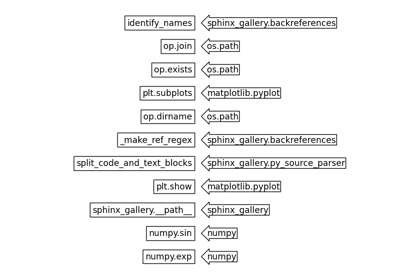sphinx_gallery.backreferences#
Backreferences Generator.
Parses example file code in order to keep track of used functions.
Functions#
- sphinx_gallery.backreferences.identify_names(script_blocks, ref_regex, global_variables=None, node='')[source]#
Build a codeobj summary by identifying and resolving used names.
- Parameters:
script_blocks (list) – (label, content, line_number) List where each element is a tuple with the label (‘text’ or ‘code’), the corresponding content string of block and the leading line number.
ref_regex (str) – Regex to find references to python objects.
example_globals (Optional[Dict[str, Any]]) – Global variables for examples. Default=None
node (ast.Module or str) – The parsed node. Default=””.
- Returns:
example_code_obj – Dict with information about all code object references found in an example. Dict contains the following keys:
example_code_obj[‘name’] : function or class name (str)
example_code_obj[‘module’] : module name (str)
example_code_obj[‘module_short’] : shortened module name (str)
example_code_obj[‘is_class’] : whether object is class (bool)
- example_code_obj[‘is_explicit’]whether object is an explicit
backreference (referred to by sphinx markup) (bool)
- Return type:
Dict[str, Any]
Examples using sphinx_gallery.backreferences.identify_names#
Classes#
- class sphinx_gallery.backreferences.NameFinder(global_variables=None)[source]#
Finds the longest form of variable names and their imports in code.
Only retains names from imported modules.
- get_mapping()[source]#
Map names used in code, using AST nodes, to their fully qualified names.
- Returns:
options – List of tuples, each tuple containing the following information about an accessed_name:
accessed name : str, fully qualified name : str if it is a class attribute (i.e., property or method) : bool if it is a class : bool if it is an explicit backreference : bool (always false here)
- Return type:
List[Tuple[str]]
